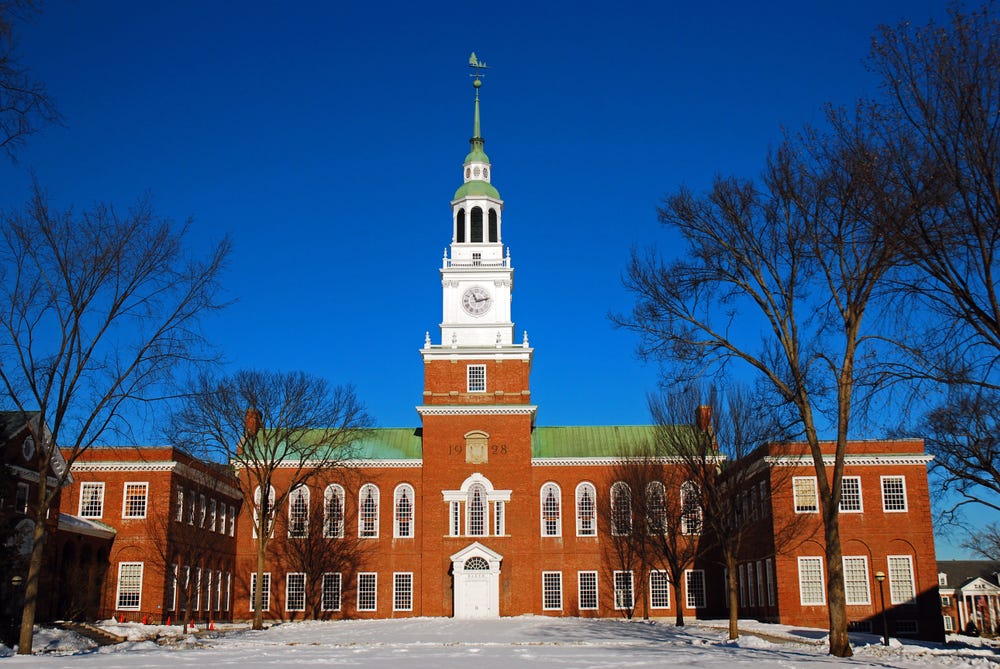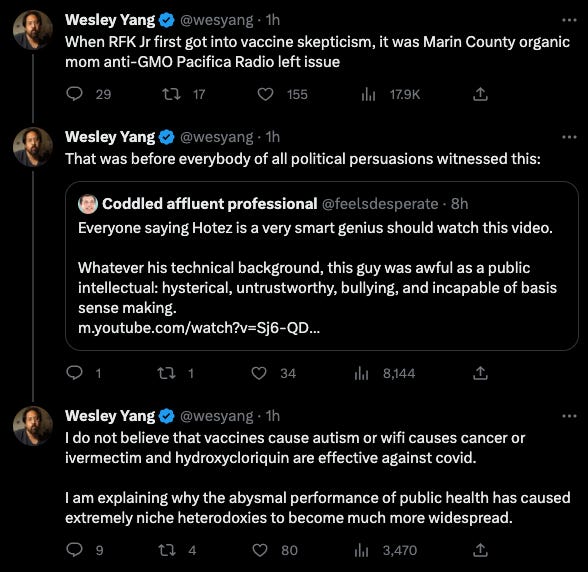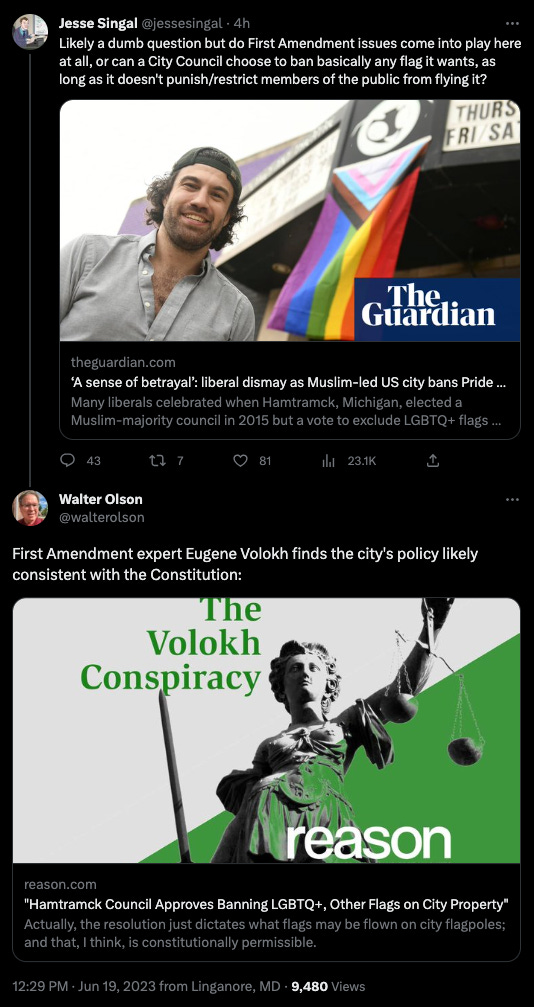E-Pluribus | June 19, 2023
The problems with Ireland's 'hate offenses' laws, public schools erode more free speech for students, and two Dartmouth presidents defend free expression.
A round-up of the latest and best writing and musings on the rise of illiberalism in the public discourse:
Natalie Alkiviadou and Jeffrey Cieslikowski: Guilty Until Proven Innocent in Ireland
The idea that hate speech laws can prevent intolerance has been widely challenged and debated, with critics often noting the unintended consequences and outcomes that were the opposite of what lawmakers intended. At Persuasion, Natalie Alkiviadou and Jeffrey Cieslikowski find that Ireland’s proposed ‘hate offenses’ bill goes much further and has worrying implications for civil liberties.
But even with the defects of hate speech laws becoming widely apparent, Ireland is committing to a significant intensification of the nation’s already-existing hate speech legislation. What’s worse, the bill introduces two terribly concerning provisions that extend far beyond hate speech laws in other countries.
First, in an ill-conceived section on “preparing or possessing material likely to incite violence or hatred,” the bill shifts the burden of proof to the accused. If the government accuses a person of possessing “hateful” material, it is up to that person to prove that he or she did not intend to distribute it to “incite” hatred. This seems all but impossible to contest in many cases. If the government charges a person for having a “hateful” meme saved in his phone, how could a person possibly prove it was meant for their eyes only—even if it was?
Second, the law, in multiple sections, specifies that “being reckless” is sufficient grounds for conviction. “Reckless,” in a legal sense, means that a person “consciously disregards a substantial and unjustified risk.” For example, drunk driving is reckless behavior. A person engaging in reckless behavior need not intend a bad outcome, but nonetheless proceeds with an action that substantially risks that outcome.
This emphasis on “recklessness” is a major deviation from the widely-accepted standard of the United Nations’ International Covenant on Civil and Political Rights, which provides that only advocacy of “hatred” may be “prohibited by law.” Moreover, a 2012 UN report stipulates that this advocacy must be “explicit, intentional, public and active support and promotion of hatred towards the target group.”
Read it all.
Eugene Volokh: Court: Public School Likely May Ban Student from Wearing "There Are Only Two Genders" T-Shirt
While high school students do not have as many First Amendment rights as, say, college students, the Supreme Court held in 1969 that public high school students do not “shed their constitutional rights to freedom of speech or expression at the schoolhouse gate.” At The Volokh Conspiracy, Eugune Volokh highlights a worrying case that could further erode free speech for high schoolers as the definition of “hate speech” continues to broaden.
From L.M. v. Town of Middleborough, decided today by Judge Indira Talwani (D. Mass.):
Plaintiff … is unable to counter Defendants' showing that enforcement of the Dress Code was undertaken to protect the invasion of the rights of other students to a safe and secure educational environment. School administrators were well within their discretion to conclude that the statement "THERE ARE ONLY TWO GENDERS" may communicate that only two gender identities—male and female—are valid, and any others are invalid or nonexistent,3 and to conclude that students who identify differently, whether they do so openly or not, have a right to attend school without being confronted by messages attacking their identities. As Tinker explained, schools can prohibit speech that is in "collision with the rights of others to be secure and be let alone."
[ . . . ]
Here, the School's rational for prohibiting the Shirt is not that LM is bullying a specific student, but that a group of potentially vulnerable students will not feel safe.
I don't think this is consistent with students' First Amendment rights under Tinker v. Des Moines Indep. School Dist. (1969) [UPDATE: see this post by Hans Bader (Liberty Unyielding)], but in any event it struck me as important to pass along. It's a vivid illustration of how discussion about gender matters is being restricted, including discussion of mainstream positions, and indeed of positions that need to be aired if there's going to be real debate rather than just government fiat. And it's a reminder of how easily "hate speech" arguments and similar arguments so easily broaden, once a precedent is set, for instance from the Confederate flag to "there are only two genders."
Read the full post.
Jonathan Nicastro: A Glimmer of Hope in the Ivory Tower
Speaking of speech on college campuses, we have recently witnessed several strong defenses of open discourse and free expression from university leaders around the country. As Jonathan Nicastro discusses at National Review, both the former and incoming presidents at Dartmouth College, Phil Hanlon and Sian Beilock, respectively, took to the pages of the Boston Globe to defend campus free speech.
Not only do Beilock and Hanlon dismiss the silencing of people for supposedly harmful opinions as illegitimate, but they also explicitly recognize the self-censorship of conservative students in “today’s left-leaning higher education landscape.”
Not to be mistaken for Republicans, the two presidents highlight right-wing threats to freedom of expression, citing a Florida bill (HB 999) that would ban the gender studies major, queer theory, and critical race theory from public colleges and universities. In the same sentence, Beilock and Hanlon take the censorship-prone Left to task, pointing to “progressives who want to restrict potentially upsetting content” as another insupportable attack on academic inquiry. The presidents even indict their own — the academy — for a refusal to recognize the confirmation bias and groupthink that render “all of us incapable of recognizing our collective humanity.”
The greatest threat to free speech, according to the presidents, is neither institutional nor political, Right or Left, but “the fear of speaking up,” which precludes students from “the only way to find common ground.” To this end, Beilock and Hanlon reject “safe spaces” as failures and call for “brave spaces,” “bastions of rigorous academic debate,” and “critical civic discourse.”
Read it all.
Around Twitter
Wesley Yang tries to explain the growth of pseudoscience:
Jesse Singal asks, does a city have the right to ban certain expressions of political viewpoints from city property?
Via Colin Wright, are words weapons?









